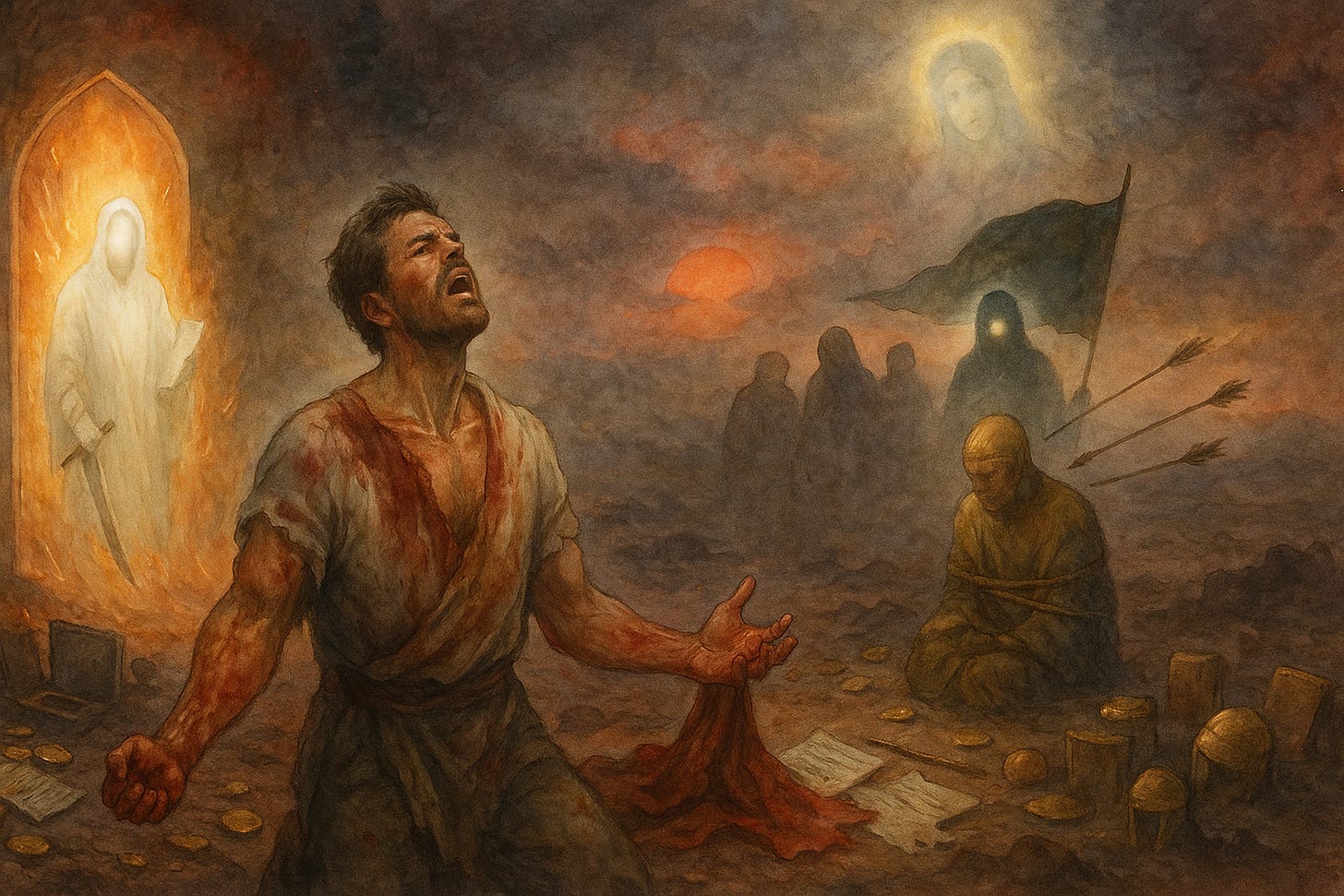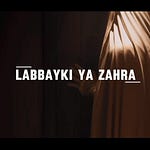In His Name, the Most High, the Lord of the Martyrs and the Truthful
Stanza 1 - “Friend of the Flame”
Peace be upon the Friend of God—
thrown not into fire by idol-worshippers,
but into silence by a nation who claimed to pray.
Peace be upon the Beloved—
whose love was betrayed by those
who lifted hands in prayer,
yet turned their backs on the very soul of Tawheed.
Peace be upon the Purified—
son of the Pure, light of Zahra’s sorrow
and Ali's sword—whose blood
was spilt by hands that moved in salat
but never trembled at the thought of God.
Stanza 2 - “The Pure Legacy”
Peace be upon the Son of the Purified—
the fruit of Zahra’s broken ribs,
the soul of the Prophet’s prayer.
Peace be upon the Child of Light—
who stood like Ibrahim amidst the idols,
yet found no miracle to cool the flames,
only the silence of a nation that once wept at his birth.
Peace be upon the One Who Was Seen,
not by tyrants, but by his mother,
as each arrow stole a breath,
and each scream of a thirsty child
tore the veil between Karbala and the unseen.
And woe to the scholars of memorised Qurans
whose hands forgot its meaning.
Woe to the men who bartered eternity
for a kingdom they never received.
O people of prayer, where was your love
when the head of Husayn was raised on a spear?
Stanza 3 - “The Oppressed Martyr”
Peace be upon the Oppressed Martyr—
whose crime was truth,
whose sentence was silence,
whose judge was the Ummah that once kissed his lips.
Saint Mary wept beneath a cross
for a son who was made to appear slain.
Sayyedah Zahra wept from the unseen
for a son who truly was.
One was spared by divine veil.
One was trampled by a nation of veiled hearts.
You loved them.
You guided them.
You forgave them.
And they answered with swords.
And now I tremble—
not at your oppressors,
but at the mirror of my own delay.
Am I one who mourns, or one who moves?
Do I raise your banner, or let it fall
to keep the approval of Pharaohs in suits?
My arm weakens…
but my heart screams:
I will not betray you, O Shaheed.
I will not greet your name with tears
and meet your cause with excuses.
Stanza 4 – “The Witness to Prayer”
I bear witness
that you established the prayer—
not only with limbs, but with love.
That you built its sanctuary not in stone
but in the soul,
and taught hearts how to kneel
even as swords circled your throat.
You gave to the beggar, the orphan, the fugitive—
not from excess,
but from hunger.
And said,
“We desire no reward—only the Face of God.”
You taught what was right,
warned against what destroys,
and obeyed not your soul,
but the One who shaped it.
Until the end.
Until the certainty.
Until the head fell,
and still the tongue moved.
And I—
I say these words with trembling lips,
drowning in sins,
ashamed to be heard by you.
Yet I see a hand—
not of blame,
but of love—
the hand of your son,
the hand of the awaited.
And I hear a voice that says:
”Rise. Repent. Return.”
The prayer must still be established.
The sword must still be sheathed in justice.
The banner must still be raised.
Be not afraid,
for the sons of Mary and Husayn
will walk again.
And they will ask:
Were you with us, or with them?
Stanza 5 – “The Rescue of Mankind”
He gave his blood—
not for land, not for throne,
but to pull us from the quicksand of ignorance,
and the wasteland of misguidance.
He offered the child, the son, the brother—
each drop of love poured out
to cleanse our hearts of arrogance and blindness.
And I—
I wallow in self-love,
draped in the filth of excuses,
while his hand still reaches out from the unseen,
“Come,” he whispers,
“You are not beyond saving.”
I weep for the mothers
who hide their poverty in shame
while pulpits demand payment
to speak in his name.
I rage against the sellers of salvation
who make merchandise of mercy,
who drug the people with dead words
while the children of Gaza die unnamed.
O son of Zahra,
you sought not to rule,
but to lift the veils from the eyes of men.
You died to raise a people
who would carry truth like fire in their palms.
And I swear—
by the blood on the sand,
by the tears of your sister,
by the cry of your son—
I will not sleep.
I will not sell.
I will not surrender.
Until we complete your mission,
or die upon its path.
“Among them are those who fulfilled their vow,
and among them are those who await—
yet they did not change in the least.”1
Stanza 6 – “The Depth of Betrayal”
They tore your limbs—
not in the heat of war,
but in the coldness of injustice.
The sword did not tremble.
The hands did not flinch.
The hearts did not feel.
Like Jesus, like Yahya, like the prophets they beheaded—
they butchered you,
not because you failed,
but because you would not bow.
And the severing continues—
in bombs dropped on nurseries,
in clinics turned crematoriums,
in wombs where life is declared “inconvenient,”
in nursing homes turned graveyards by the children they raised.
O Husayn—
I see your body in every corpse crushed beneath progress.
I see your ribs in every soul broken by betrayal.
I see your blood in every sin I commit
while wearing your name on my lips.
But I also hear a voice—
not of shame,
but of invitation.
”If your limbs are torn by sin,
bind them with repentance.
If your heart is fractured,
let it beat again for truth.”
The Mahdi calls,
the Rope of God still hangs,
the door is still open.
And though I am unworthy—
I will walk through it.
Because this is the way.
This is the way.
Stanza 7 – “The Forgotten Duty”
He was killed
by those whom Islam had raised.
Not by strangers,
but by the memorisers of the Quran.
Not by idol-worshippers,
but by those who bowed without bowing within.
And I—
I weep,
not only for Husayn,
but for the terrifying truth
that I could be one of them.
I speak of tabyeen—
but do I clarify for myself?
Or do I cover truth with commentary
and call my betrayal “scholarship”?
I look in the mirror
and see Umar ibn Saʿad
whispering,
“Rey is worth it.”2
I fall to my knees,
unable to stand before Zahra
with the blood of her child on my hands.
But then—
a voice.
A flag.
A cry from the distance.
I see the sun rising in the West.
I see Sajjad, upright in chains.
I see Zaynab, undefeated in sorrow.
And I see him—
the son of Husayn,
my Master,
the ache in my soul,
The Yusuf of Zahra.
And I cry:
”Do not let me fall.
If they beat me, strengthen me.
If they tempt me, blind me.
If I forget, remind me.”
O Lord—
train me in love,
crucify my ego,
and make me a roar against injustice.
So that your Name,
and your Name alone,
is always the Most High.
Stanza 8 - “The Loyalty of the Follower”
I bear witness—
not with tongue alone,
but with this trembling soul.
That I am with you,
in peace and in war,
in silence and in storm,
in public and in secret.
Though my hands have strayed,
though my eyes have wandered,
though I have failed you more times than I dare to count—
still I say:
I am with you.
And if my hands betray you,
I will sever them.
If my eyes deceive you,
I will blind them.
All I want—
is a glance.
One glance from the Yusuf of Zahra.
One glance from the Mahdi in occultation.
One glance from the heart of the Prophet,
that will say: “You are not forgotten.”
My wealth is yours.
My family is yours.
My blood, my breath, my voice—
my everything is yours.
If they strike your Wali,
let me be the shield.
If they curse him,
let me be the tongue that answers.
If they aim arrows at his chest,
let me be the one who stands and takes them—
until there is nothing left but dust.
And if I must be torn,
cut,
burned,
and torn again—
a million times over—
I will not flinch.
Because to stand with Sayyed Ali
is to stand with you.
To defend your representative
is to kiss the feet of your grandfather.
And to stand with your blood—
is to stand with God.
This is my covenant.
My allegiance.
My vow.
If I break it,
O God, cast me from Your mercy.
For what good is paradise
without the smile of Husayn?
Stanza 9 - “The Call to the Living”
With you.
With you.
Never with your enemy.
No matter how far I fall,
no matter how dark the night—
I will never stand with those
who profit from your wounds
and wear your name like a mask.
I want nothing from them.
No alliances.
No truce.
No tolerance.
How can I share breath
with those who sell your blood
for silver soaked in children’s screams?
How can I ever trust the ones
who betrayed Husayn
not to betray the Mahdi?
I will fight them.
Expose them.
Pray that God casts them
from the shade of His mercy
until they awaken or perish.
They speak of heaven,
and buy homes with crocodile tears.
But how will they pass the Gate
when Ali stands there with a sword
and a book of names?
I am not with them.
Not with the tyrants.
Not with the bankers who enslave.
Not with the politicians who kneel to capital.
Not with the scholars who have forgotten how to weep.
If they cut me,
burn me,
tear me to pieces,
a million times—
I will not relent.
My allegiance is eternal—
in this world and the next.
And if I must fall into Hell
for my sins—
even from its depths I will cry:
”Where are you, O Hope of the Believers?”
O Lord of Husayn—
if I am to live,
let it be for truth.
If I am to die,
let it be for loyalty.
Take me before I betray
the ones I love.
Before I shame
the eyes of Zahra.
Stanza 10 - “The Eternal Reunion”
All that I have,
and all that I am,
I place at your feet.
My soul is yours.
My heart is yours.
My body is yours.
My strength, my weakness,
my voice, my silence,
my hands, my feet,
my opinions, my desires—
even my shame—
all yours.
I come with nothing.
I come as dust.
I come as sin upon sin,
tremble upon tremble,
still hoping You will not cast me away.
For though I am broken,
I am yours.
I am oppressed by my own crimes,
but I rise as an enemy to the oppressor.
And I swear—
if You know that I am false,
then destroy me.
Burn me.
Scatter me into fire.
But if You know my love is true,
then make me worthy.
Shield me from my self.
Guard me from their plots.
And let me serve, even if only
to sweep the earth where Mahdi walks.
Let me be one
whose breath brings joy to Zahra.
Let me be one
whose whisper does not shame Ali.
Let me be one
whose love makes Husayn smile
even once.
O my Lord—
I am Yours.
I am theirs.
Forgive me.
Forgive me.
Forgive me.
Stanza 11 - “The Rise of the Witnesses”
“I saw nothing but beauty”,
said Zaynab in chains,
while I crumble at the weight of smaller griefs.
Teach me to see as she saw.
To love as she loved.
To rise as she rose—
undefeated, unveiled, unafraid.
I see Sajjad,
greeting his father’s severed head
with peace,
whispering the verses of the Cave—
reminding us that the sleepers will wake,
and Mahdi shall rise.
And I see the abused mother of the Mahdi—
insulted like Maryam,
her rights stolen, her dignity shattered,
her pain buried in our silence.
They said they loved the Prophet
while tearing apart his daughter.
They said they worshipped God
while slaughtering His light.
And still today—
the child killers of Gaza
are blessed by the priests of empire.
The murderers of Hind Rajab
are praised by politicians who smile through genocide.
But we have not forgotten.
The graves of the martyrs whisper.
The tears of children echo in the Arbaeen march.
And the Mahdi hears every cry.
Divine love is not poetry.
It is protest.
It is protection.
It is standing in front of the bullet
and daring it to pass.
I see the people of Bahrain,
of Yemen, of Nigeria,
of Lebanon, of Syria,
of the broken homes and broken hearts—
and I scream:
“Where is the justice You promised, O Lord of Husayn?”
I remember the Risalat al-Huquq—
the Charter of Rights
that Sajjad gave the world,
and I vow:
I will not forget the right of the poor.
I will not forget the right of the prisoner.
I will not forget the right of the child.
If Mahdi is delayed because of me—
then let me be reshaped.
Burned, broken, reformed,
but not left behind.
Let me be the soil beneath his feet.
Let me shield him like the lovers of Karbala
shielded Husayn during prayer.
And in his absence,
let me never doubt his flag-bearer.
Let me serve the Wali al-Faqih
with such loyalty that my hands move
before his voice finishes the sentence.
If I cannot follow the one who represents him—
how can I claim to follow him?
Let me die before I betray that trust.
Kill me, O Lord,
before I become a wound
in the heart of Mahdi.
Stanza 12 - “The Last Testament”
I have come,
broken and sinful,
to this grave of fire and fragrance.
I do not bring perfection.
I bring longing.
I bring wounds.
I bring the ache that would not let me sleep.
I bring a promise—
sealed in pain,
carved in tears,
that I will not betray you.
O Husayn—
this world did not deserve you.
And I have not yet made myself
worthy of your dust.
But still I crawl to you,
from behind veils of shame,
and whisper:
“Will you accept me?”
I am not from the 72.
I am not from the pure.
I am not from the brave.
But I am from the broken.
And the broken have always belonged to you.
Let me weep at your grave
until my heart becomes clean.
Let me whisper your name
until my soul remembers who it was.
Let me walk in your shadow
until the sun of Mahdi rises
and burns away the night.
And if I die before that dawn,
bury me near your lovers.
Mark my grave with no name.
Just write:
“This one tried.”
O my Lord—
O Rahman, O Raheem—
accept this whisper.
Accept this march.
Accept this Communion.
For You alone are the goal,
and You alone remain.
And from Him alone is all ability and He has authority over all things.
Quran, Surah al-Ahzaab (the Chapter of the Confederates) #33, Verse 23
Umar ibn Sa’ad, the commander of Yazid’s forces, responsible for the murder of Imam Husayn, his companions and family on the fateful day of Ashura, was promised the ‘Kingdom of Rey’ (modern day Tehran), by Yazid in return for the murder of Imam Husayn. Till his dying day, he didn’t get that; and Imam Husayn had told him that “You will not even taste the wheat of Rey”.





















